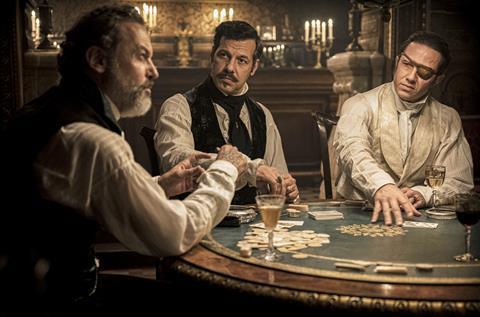Pathe follows up the Three Musketeers with another lavish spin of a classic Alexandre Dumas swashbuckler

Dirs/scr: Matthieu Delaporte, Alexandre De La Patellière. France. 2024. 178mins
Everything about this robust and very enjoyable retelling of the Alexandre Dumas classic is epic in scale: from the lavish sets and the orchestral score to the bold performances and the hefty running time. But it is an epic approach that is well-earned by writing and directing duo Matthieu Delaporte and Alexandre De La Patellière (who collaborated on the screenplays of the recent Three Musketeers films, a similarly swashbuckling Dumas adaptation). This is a devilishly handsome old-school tale of treachery and intrigue that zips through its nearly three hours in a blur of swordplay, glorious costumes and prosthetic rubber facial disguises.
Reportedly the most expensive French production of the year, and every last euro ends up on the screen
This latest version of the much-adapted tale is not about taking filmmaking risks or storytelling liberties. It is true to the spirit of the source material, if not entirely true to the original story; it aims for quality over innovation in its approach. While it lacks some of the sexual crackle, mischief and ambitious fight choreography of the well-received Musketeers movies, which are probably the closest comparison in terms of the picture’s commercial potential, it is a top tier adventure movie that should find a receptive audience domestically and elsewhere. Its Cannes Out Of Competition screening is a nice high-profile launch for its French release on June 28; Samuel Goldwyn Films holds the US rights. (The Count also gets another outing this year, in an eight part TV series starring Sam Claflin as Edmond and Jeremy Irons as fellow prisoner Abbé Faria.)
This film sets the action bar high from the outset, with a daring sea rescue by Edmond Dante (Pierre Niney) of a young woman, who tells him that her name is Angele, but then bids him to forget her. Edmund’s actions see him at odds with the ship’s captain, the brutal and proud of it Danglars (Patrick Mille). Edmund is confined below decks, but when Danglars complains about the young sailor’s reckless bravery to the ship’s owner, the man sacks Danglars and promotes Edmund to captain in his stead.
With his new status and income, Edmund is finally in a position to wed the love of his life, Mercedes (Anaïs Demoustier). But at the altar, Edmund is dragged away and charged with treason. Thanks to the nefarious actions of three men – aggrieved former captain Danglars, Edmund’s close friend Fernand (Bastien Bouillon), who covets the lovely Mercedes, and the slippery prosecutor, Gerard De Villefort (Laurent Lafitte), who has his own reasons for interfering the with the case – Edmund is imprisoned without trial in a dungeon on the fortified island prison, the Chateau D’If.
It takes fourteen years in the damp stone-walled cell, a friendship with an inspiring fellow prisoner, Abbé (Pierfrancesco Favino), a lot of dishevelled beard growth and a full hour of the film’s running time before Edmund manages to escape.
He returns to discover that his love has married his so-called best friend and that his father died of grief. He is also, thanks to the obliging Abbé, now extremely wealthy. “Will you do good?” asks Abbé, as he reveals the secret location of untold treasures. “Or will you fill your heart with hate?” Edmund opts for the cold, calculating motivation of hate, although he prefers to think of it as justice rather than revenge. With a fake face and a new identity as the Count of Monte-Cristo, plus two exceptionally beautiful and bitter sidekicks, Andréa (Julien De Saint-Jean) and the bewitching Haydée (Anamaria Vartolomei), Edmund sets out to exact retribution.
Location choices are atmospheric throughout, with Edmund’s miserable cell a dramatic contrast to his later abodes: the Count resides in a huge ego trip of a mansion, complete with domes, towers and exotically ostentatious interior decor. He even has a concealed shooting range behind a mechanical wood panelled artificial wall, a detail that marks him out in the eyes of Fernand as both un homme serieux and un homme seriously minted. The production design is spectacular: this is reportedly the most expensive French production of the year, and every last euro ends up on the screen. And the score, by Jérôme Rebotier, matches the film’s spectacular visual impact – it’s vivid, stirring and full-blooded; it maintains the energy of the picture even in its more pensive moments.
Both Haydée and Andréa nurture their own grievances against one or more of Edmund’s enemies, both are highly invested in the downfall of the men who harmed them. But even a decades-in-the-making and enormously well-funded plot such as Edmund’s is not entirely infallible once passions take over. The heart wants what it wants, after all, even if, in Haydée’s case, that means the son of the man who betrayed and slaughtered your father and then sold you into slavery. And true love has a way of seeing past a rubber fake face: in her heart, Mercedes knows that the Count is not who he claims to be. But both she and Edmund come to realise that, after decades of suffering and a diet of intricate, obsessive hatred, he is no longer the man she fell in love with.
Production company: Pathe, Chapter 2
International sales: Pathe Films marie-Laure.Montironi@pathe.com
Producer: Dimitri Rassam
Cinematography: Nicolas Bolduc
Production design: Stéphane Taillasson
Editing: Celia Lafitedupont
Music: Jérôme Rebotier
Main cast: Pierre Niney, Anaïs Demoustier, Bastien Bouillon, Laurent Lafitte, Patrick Mille, Anamaria Vartolomei, Vassili Schneider, Julien De Saint-Jean, Pierfrancesco Favino
























